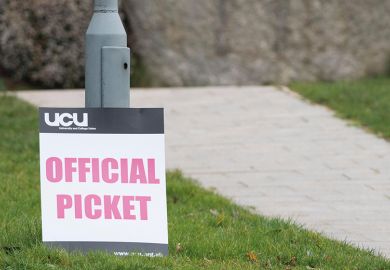I fervently want to keep my defined benefit pension plan for purely selfish reasons.
However, it’s hard to justify why I should have a defined benefit pension – which is a superior option to the defined contribution alternative being offered to Universities Superannuation Scheme members – when the vast majority of DB schemes are already closed.
For instance, the DB pension scheme with my employer, the University of Leicester, was closed to new entrants since 2003 and to future accrual since March 2016. Is it realistic or reasonable to assume that grades 6 and above will continue to enjoy DB accrual indefinitely while grades 5 and below don’t?
We have also heard how something that is personally disadvantageous to one lecturer after another is therefore suddenly going to damage higher education irrevocably. This view depicts academic life as so uniquely risky that only the safety blanket of a DB pension will persuade people to do it. However, they are not seen necessary in many other top global universities. For example, all of the top universities in the US mainly have DC pension schemes.
The rationale for the change is not dubious. The vast majority of DB pension schemes follow the same funding approach as the one used by the USS that has revealed such large deficits, as was recently confirmed by research carried out by Punter Southall.
Neither do I agree that the funding approach proposed is unduly prudent, as many academics have claimed. A recent Green Paper, the consultation for which ended in May 2017, considered six questions, with the first focusing on whether current valuation measures were the right ones. It suggested that stricter interim funding targets be set for schemes that were severely underfunded and gave an example of what they meant by this as being less than 100 per cent funded on the Pension Protection Fund basis – USS was 82 per cent funded on the PPF basis at the last valuation.
As such, I have resigned my membership of the UCU as a result of this ill-conceived strike action. I urge other members who feel a similar discomfort about what they are being asked to do to consider whether they need to do the same.
I will admit – as the head of public sector pensions at KPMG also did recently – that the UCU has won the communications battle. Victory appears to be total.
However, there remains a problem, which we seem to be facing increasingly in recent years, from Trump to Brexit, and that is this: what to do when the victory you have won is based on campaign arguments that are fundamentally untrue, not backed by evidence or existing pensions legislation and, ultimately, undeliverable? Just keep saying no to any workable option that is put to you?
On the deficit, for instance, we know that the initial valuation proposed by the USS trustee to the pensions regulator, and the covenant assessment on which it was based (ie, the willingness and ability of the employers in UUK to continue paying contributions), were both rejected.
As this initial valuation disclosed a deficit of just over £5 billion, the proposal resulting in a £7.5 billion deficit finally presented to the Joint Negotiating Committee would appear to be as low as the trustee could reasonably go and still get the valuation past the regulator.
So, if the deficit is what it is and there is no scope for weakening the funding assumptions further, and maintaining current benefits on these funding assumptions involves contribution increases that are unacceptable to scheme members and the employers, what is this dispute about now?
The time has come for lecturers to decide what they want. If a £42,000 cap for three years while negotiations continue on a long-term structure of the scheme that doesn’t leave all risk with scheme members is not acceptable, we need to decide pretty quickly what is. Because once we move to a DC arrangement, the chances of us moving back to any form of risk sharing subsequently are, in my view, remote.
There are many possible alternative structures and many ways of sharing the risks between employers and scheme members. In particular, let’s not get too obsessed with collective DC schemes, the enabling legislation for which has yet to materialise. Consider all the alternatives and let proper negotiations commence.
Nick Foster is programme director for BSc mathematics and actuarial science at the University of Leicester’s Department of Mathematics, and a qualified actuary. This piece is taken from blogs on his personal website, We Know Zero.
Register to continue
Why register?
- Registration is free and only takes a moment
- Once registered, you can read 3 articles a month
- Sign up for our newsletter
Subscribe
Or subscribe for unlimited access to:
- Unlimited access to news, views, insights & reviews
- Digital editions
- Digital access to THE’s university and college rankings analysis
Already registered or a current subscriber?









